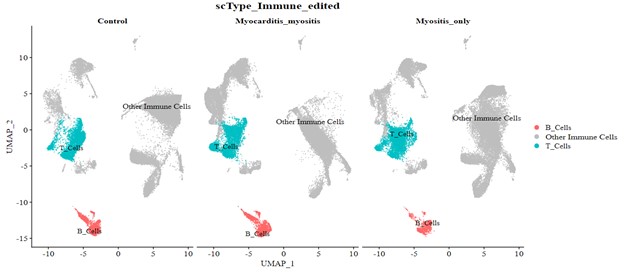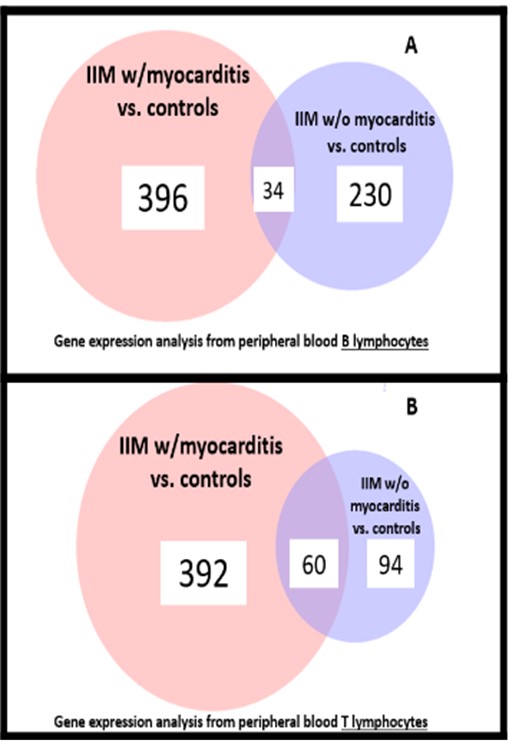Session Information
Date: Sunday, November 17, 2024
Title: Muscle Biology, Myositis & Myopathies – Basic & Clinical Science Poster II
Session Type: Poster Session B
Session Time: 10:30AM-12:30PM
Background/Purpose: Cardiac involvement, such as myocarditis, in idiopathic inflammatory myopathies (IIM) is a negative prognostic factor associated with increased mortality. The gold standard for myocarditis diagnosis is the detection of characteristic histopathologic changes on endomyocardial biopsy. However, tissue sampling is not always feasible due to invasiveness and low sensitivity. There is therefore an urgent need to develop tools to identify cardiac involvement in IIM. In addition, there is a need to understand the immunological process that lead to cardiac involvement in specific subgroups of IIM patients.
Methods: To address these gaps in knowledge we identified patients in a longitudinal myocarditis sub-cohort study of IIM. Active myocarditis and lack of myocarditis were defined according to the 2013 European Society of Cardiology (ESC) guidelines and the 2018 Lake Louise Criteria for myocarditis on cardiac MRI. Patients with inclusion body myositis were excluded. Cryopreserved peripheral blood mononuclear cells (PBMCs) from these patients and healthy controls were analyzed by high throughout single cell RNA sequencing.
Results: Four patients with IIM-associated myocarditis, four patients with IIM without myocarditis, and 4 healthy controls were included for single cell analyses. The 4 patients with IIM-associated myocarditis were composed of anti-Ku + overlap IIM with scleroderma (n=3), and PL-7 positive anti-synthetase syndrome (n=1). The 4 IIM patients without myocarditis included patients with HMGCR+ immune mediated necrotizing myopathy (n=2) and dermatomyositis (TIF-1 gamma positive and Ro 60 positive (n=2). All patients with myocarditis had elevation in serum troponin-I. All patients were treated with immunosuppression. We identified B cells and T cells based on gene expression signatures (Figure 1). Gene expression analyses demonstrated that peripheral blood B and T lymphocytes from IIM patients with myocarditis had a higher number of differentially expressed genes vs. controls as compared to patients with IIM alone (see Figure 2). Ingenuity pathway analyses of these differentially expressed genes highlighted a remarkable degree of activation of multiple immune response related pathways in B-cells from patients with IIM associated myocarditis that was not observed in patients with IIM alone.
Conclusion: Single cell RNA sequencing of PBMCs suggests that B-cell dysregulation might drive myocardial inflammation in patients with IIM who develop myocarditis.
To cite this abstract in AMA style:
Paik J, Bermea K, Duque C, Mugnier M, Adamo L. Dysregulation of Peripheral Blood B-cells Is Associated with Myocarditis in Patients with Idiopathic Inflammatory Myopathies [abstract]. Arthritis Rheumatol. 2024; 76 (suppl 9). https://acrabstracts.org/abstract/dysregulation-of-peripheral-blood-b-cells-is-associated-with-myocarditis-in-patients-with-idiopathic-inflammatory-myopathies/. Accessed .« Back to ACR Convergence 2024
ACR Meeting Abstracts - https://acrabstracts.org/abstract/dysregulation-of-peripheral-blood-b-cells-is-associated-with-myocarditis-in-patients-with-idiopathic-inflammatory-myopathies/


